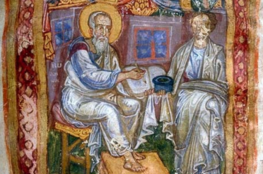David Bentley Hart’s essay, “The Myth of Schism,” which was published nearly seven years ago, won’t go away. Though given little notice by the Orthodox community at the time of its release, it has since become one of the lynchpins of Catholic (and some Orthodox) ecumenical hopes and dreams. Just when I assumed the essay had been mined (and criticized) for all that it is worth, along comes Mark Shea to quote the essay’s most perplexing, and some might say mythical, paragraph. Here’s a sample:
I like to think—call it the Sophiologist in me—that the tribulations that Eastern Christianity has suffered under Islamic and communist rule have insulated it from some of the more corrosive pathologies of modernity for a purpose, and endowed it with a special mission to bring its liturgical, intellectual, and spiritual strengths to the aid of the Western Christian world in its struggle with the nihilism that the post-Christian West has long incubated and that now surrounds us all, while yet drawing on the strengths and charisms of the Western church to preserve Orthodoxy from the political and cultural frailty that still afflicts Eastern Christianity. Whatever the case, though, we are more in need of one another now than ever.
First, let me note that I am indeed very sympathetic toward Hart’s conclusion that Catholicism and Orthodoxy “are more in need of one another now than ever.” Hyper-traditionalist Catholics, intoxicated with a very myopic view of ecclesial history, may not think much of the Church’s “need” for the East, but I do. The Eastern Catholic churches heroically fulfill part of that need, but their size and relative isolation from Rome conspires against their theological, liturgical, and spiritual witness. There is, as they say, strength in numbers; and so of course we should welcome millions of more souls into the Corpus Mysticum and rejoice that their tradition should be allowed to shine in full. My sense right now, however, is that there are few Orthodox who would say as much about their need for the Roman Church.
Second, let me also state clearly that Hart’s appeal to the East’s “insulat[ion] from some of the more corrosive pathologies of modernity” reads more like an empty hope than a fact. As any reader of (Russian Orthodox) Fr. Georges Florovsky’s two-volume The Ways of Russian Theology surely knows, Orthodox theology was neither transmitted nor developed independent of “Western thought,” including modern pathologies. Indeed, one of the key projects of 20th C. Orthodox theology has been to “recover” or “restore” an allegedly “lost” Orthodox theological tradition, one which was violently interrupted and then slowly bled out in the early centuries of the last millennium. That story can be a bit much at times, and it’s not without critics; however, there seems to be a wide recognition among contemporary Orthodox voices that “the East” (however understood) was never out of modernity’s reach.
Third, though the movement has not been uncontroversial, I believe it is safe to say that the Roman Catholic Church, for more than a century, has internalized a great deal of the Eastern Christian liturgical, intellectual, and spiritual deposit, albeit with mixed results. In fact, one might say that the results are “mixed” because the mixing of traditions itself was highly imprudent. An excessive fascination with “things Eastern” (or what certain theologians and reformers assumed were “things Eastern”) prompted a premature, and in my estimation damaging, abandonment of “things Western.” Certainly matters were not helped by the desire of some “broadminded clerics” to play the Christian East off against the Christian West, using inchoate theological speculations and other vagaries yanked from Patristic sources to do an end-run around Scholasticism and, some might say, the Church’s magisterium altogether.
Last, I detect no “mission” on the part of the Orthodox to either enlighten or save “the West” (again, whatever that means). Though some ex-Catholic and Protestant converts to Orthodoxy believe that the Eastern patrimony gives them a firm basis upon which to critique “the West,” that’s a much different project than saving it. If anything, the construct that is “the West” serves as a foil for Orthodox triumphalism. Taken to the political level, as it often is in Russia, “the West” is diseased being, riddled with secularism, relativism, indifferentism, nihilism, and so forth; “the West” must be resisted, not converted. “The West” is, in a Schmittian sense, the enemy which inadvertently assists the Orthodox in knowing who they are. There’s nothing salvific, or holy, about that.



